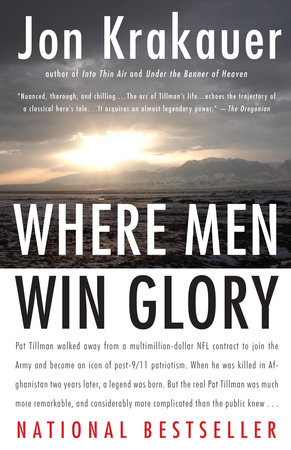Where Men Win Glory Reader’s Guide
By Jon Krakauer


1. What aspects of Jon Krakauer’s narrative style make his telling of Pat Tillman’s story especially powerful?
2. After Tillman died, a copy of Jon Krakauer’s Eiger Dreams, a book about eccentric mountain climbers, was found in his backpack. He had also read and admired Into the Wild and Under the Banner of Heaven. Why would Tillman be drawn to Krakauer’s writing? Why would Krakauer be drawn to write about Pat Tillman?
3. What made Tillman such an unusual football player, both on and off the field? What stereotypes did he defy and transcend?
4. What are Pat Tillman’s most admirable qualities?
5. In what ways did Tillman’s time in jail change him?
6. What role did Tillman’s idealism and personal code of ethics play in his death? Is Krakauer right in suggesting that it was Tillman’s “stubborn idealism—his insistence on trying to do the right thing” [p. 406344] that brought him down?
7. Krakauer writes that “The juxtaposition of Pat’s vulnerability with his fearlessness and self-assurance is not an easy thing to wrap one’s mind around, but it was an absolutely central aspect of his personality” [p. 7363]. What instances in Tillman’s life reveal this unlikely combination of character traits? How is it possible to wrap one’s mind around it? Why are these traits so rarely joined in a single person in American culture?
8. Imagine the conversation that Tillman and Noam Chompsky would have had if their meeting had taken place. What might they have talked about? How might they have regarded each other?
9. What made Pat and Marie’s relationship so special? In what ways does the depth of their bond make Tillman’s death even more heartbreaking?
10. Krakauer begins Part Two of Where Men Win Glory with an epigraph by Chris Hedges: “War is always about betrayal, betrayal of the young by the old, of idealists by cynics and of troops by politicians” [p. 153133]. In what ways and by whom, specifically, was Pat Tillman betrayed?
11. Discuss the events that led to Tillman’s death by friendly fire 248-281and assess for yourselves who should have been held responsible for Tillman’s death and what the appropriate punishment should have been. What Aarmy protocols were broken in the lead- up to, and during, the firefight? What protocols and regulations were broken in the immediate aftermath of Tillman’s death?
12. As revealed in Where Men Win Glory what crucial mistakes has the United States made in its decades-long involvement in Afghanistan? What have been the consequences of these mistakes?
13. While stationed in Iraq, Tillman wrote in his journal: “My hope is that decisions are being made with the same good faith that Kevin and I aim to display…. I hope [this war is about] more than oil, money, & power…. I doubt that it is” [p. 196169]. What experiences are most responsible for changing Tillman from a patriotic and somewhat naive idealist to a sober-eyed realist?
14. When Tillman was killed, Krakauer writes, “White House perception managers saw an opportunity not unlike the one provided by the Jessica Lynch debacle thirteen months earlier” [p. 349295]. How did the “perception managers” in the Bush administration respond to Tillman’s death? How did they use it to their advantage? What are the similarities between their handling of Jessica Lynch and Pat Tillman?
15. Discuss the ironies that emerge from the fact that Pat Tillman’s personal code of courage, honor, honesty, and integrity was used so cynically and deceitfully by the Bush administration to further its own agenda.
16. How did Tillman’s family react to Pat’s death and to the White House cover-up of how he died? What positive results have come from the Tillman family’s response to Pat’s death?
(For a complete list of available reading group guides, and to sign up for the Reading Group Center enewsletter, visit www.readinggroupcenter.com)